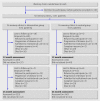Effectiveness of a specific care plan in patients with Alzheimer's disease: cluster randomised trial (PLASA study)
- PMID: 20522656
- PMCID: PMC2881198
- DOI: 10.1136/bmj.c2466
Effectiveness of a specific care plan in patients with Alzheimer's disease: cluster randomised trial (PLASA study)
Abstract
Objective: To test the effectiveness of a comprehensive specific care plan in decreasing the rate of functional decline in patients with mild to moderate Alzheimer's disease compared with usual care in memory clinics.
Design: Cluster randomised trial.
Setting: 50 memory clinics in France.
Participants: Patients with Alzheimer's disease (mini-mental state examination score 12-26). 1131 patients were included: 574 from 26 clinics in the intervention group, and 557 from 24 clinics in the usual care (control) group. Memory clinics were the unit of randomisation.
Intervention: The intervention included a comprehensive standardised twice yearly consultation for patients and their caregivers, with standardised guidelines for the management of problems identified during the assessment.
Main outcome measures: The primary outcome measure was change on the Alzheimer's Disease Cooperative Study-activities of daily living scale assessed at 12 and 24 months. Secondary outcome measures were the rate of admission to institutional care and mortality.
Results: At two years the assessment was completed by 58.4% (n=335) of patients in the intervention group and 61.6% (n=343) in the control group. The rate of functional decline at two years did not differ between the groups. The annual rate of change on the Alzheimer's Disease Cooperative Study-activities of daily living was estimated at -5.73 (95% confidence interval -6.89 to -4.57) in the intervention group and -5.96 (-7.05 to -4.86) in the control group (P=0.78).
Conclusion: A comprehensive specific care plan in memory clinics had no additional positive effect on functional decline in patients with mild to moderate Alzheimer's disease. Future research should aim to determine the effects of more direct involvement of general practitioners.
Trial registration: ClinicalTrials.gov NCT00480220.
Conflict of interest statement
Competing interests: All authors have completed the unified competing interest form at
Comment in
-
Care plans for people with Alzheimer's disease.BMJ. 2010 Jun 3;340:c2626. doi: 10.1136/bmj.c2626. BMJ. 2010. PMID: 20522658 Free PMC article.
References
-
- Lyketsos CG, Colenda CC, Beck C, Blank K, Doraiswamy MP, Kalunian DA, et al. Task Force of the American Association for Geriatric Psychiatry. Position statement of the American Association for Geriatric Psychiatry regarding principles of care for patients with dementia resulting from Alzheimer disease. Am J Geriatr Psychiatry 2006;14:561-72. - PubMed
-
- Small GW, Rabins PV, Barry PP, Buckholtz NS, DeKosky ST, Ferris SH, et al. Diagnosis and treatment of Alzheimer disease and related disorders. Consensus statement of the American Association for Geriatric Psychiatry, the Alzheimer’s Association, and the American Geriatrics Society. JAMA 1997;278:1363-71. - PubMed
-
- Grossberg GT, Desai AK. Management of Alzheimer’s disease. J Gerontol A Biol Sci Med Sci 2003;58:331-53. - PubMed
-
- Waldemar G, Dubois B, Emre M, Georges J, McKeith IG, Rossor M, et al. Recommendations for the diagnosis and management of Alzheimer’s disease and other disorders associated with dementia: EFNS guideline. Eur J Neurol 2007;14:e1-26. - PubMed
-
- Gifford DR, Holloway RG, Frankel MR, Albright CL, Meyerson R, Griggs RC, et al. Improving adherence to dementia guidelines through education and opinion leaders: a randomized, controlled trial. Ann Intern Med 1999;131:237-46. - PubMed
Publication types
MeSH terms
Associated data
LinkOut - more resources
Full Text Sources
Medical

